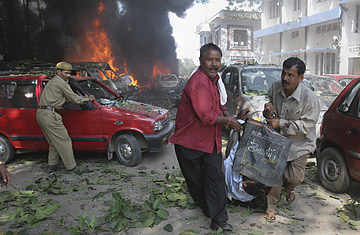
A seriously wounded man is removed from near a blast site in Gauhati, India, Thursday, Oct. 30, 2008.
The long troubled northeastern corner of India is seeing an escalation of violence even as the rest of the country contends with a series of terror bombings over the last few weeks. On Thursday, a series of co-ordinated bomb blasts in the Indian state of Assam — nine of them detonated in four cities in the span of 15 minutes — killed at 61 people and injured at least 300. The question now is whether the perpetrators of the attacks were regional separatists or a wider network of radical jihadists.
The blasts began at about 11 a.m. local time in Assam, a mainly rural state best known for its tea plantations. Three of them were car bombs set off in its capital and largest city, Guwahati, according to R.N. Mathur, the state's director general of police. Those blasts did the most damage, killing 31 and injuring 147. The remaining six blasts hit smaller towns in lower Assam, near the Bangladesh border, and were smaller in scale, using explosives left on bicycles and motorbikes. Two of the bombs in Guwahati were set off near government targets: a police station, the office of the deputy commissioner of the state's civil service, but the one that did the worst damage was left under an elevated highway, according to Deputy Inspector General D.P. Singh of the state police.
No one has yet claimed responsibility for the attack, and the chief minister of the state, Tarun Gogoi, was careful not to blame any group in particular. "We are determined to deal firmly with the militants, whoever they are," he said at a press conference a few hours after the blasts. Early reports from officials in Assam pinned the blasts on the United Liberation Front of Assam (ULFA), a group that has been agitating against the government since 1979. (See here for a TIME Archive story on the origins of Assam's troubles.) Its often violent campaign for a sovereign Assam began in earnest in 1990. The group seeks an end to what it has called "colonial rule" by the central government in New Delhi and the expulsion of non-Assamese, particularly Hindi-speakers, from the state. ULFA has denied responsibility for the blasts.
The Army and state police have largely put down the movement through force and through a strategy of persuading militants, often through their families, to surrender, re-enter "the mainstream" and accept financial assistance. Peace talks with ULFA broke down in 2006, and two battalions of the group have refused to surrender, setting up bases in neighboring Bangladesh and in Burma, intelligence officials say. P.K. Mishra, inspector general of the Border Security Force for the Assam & Meghalaya frontier, who spoke to TIME from his headquarters in the city, says he thinks the blasts are the work of the two ULFA battalions which have not surrendered. "They wanted to show their strength," Mishra says.
Some defense analysts say these attacks, which are similar in scope and sophistication to recent attacks in New Delhi, Ahmedabad, Bangalore and Jaipur, could be the work of a jihadi group. Sreeradha Datta, of the Institute of Defense and Security Analysis in New Delhi, sees the influence of Harkat ul Jihad ul Islami, which is based in Bangladesh and has ties to ULFA, or some other jihadi organization operating within India. "This is part of the larger terrorist problem which has gripped India recently," Datta says. "They [ULFA] belong to Assam. They don't want to antagonize the Assamese."
Whichever group eventually claims responsibility, they are not alone in their frustration with the state government. After the bombs went off, an angry group of people vented their frustration over the time it took for help to reach the dozens hurt by the blasts. When the police and fire brigade arrived, the mob pelted them with stones and set fire to government vehicles. Singh, the police official, said he was hit with one of the stones and required three stitches in his leg. The central government, too, is treating this attack as a significant blow to its attempts to improve security in India, in particular its effort to tame the militancy in the northeast by pouring millions of dollars in development to the area. Prime Minister Manmohan Singh is expected to arrive in Guwahati on Friday. With reporting by P.P. Singh/Guwahati
